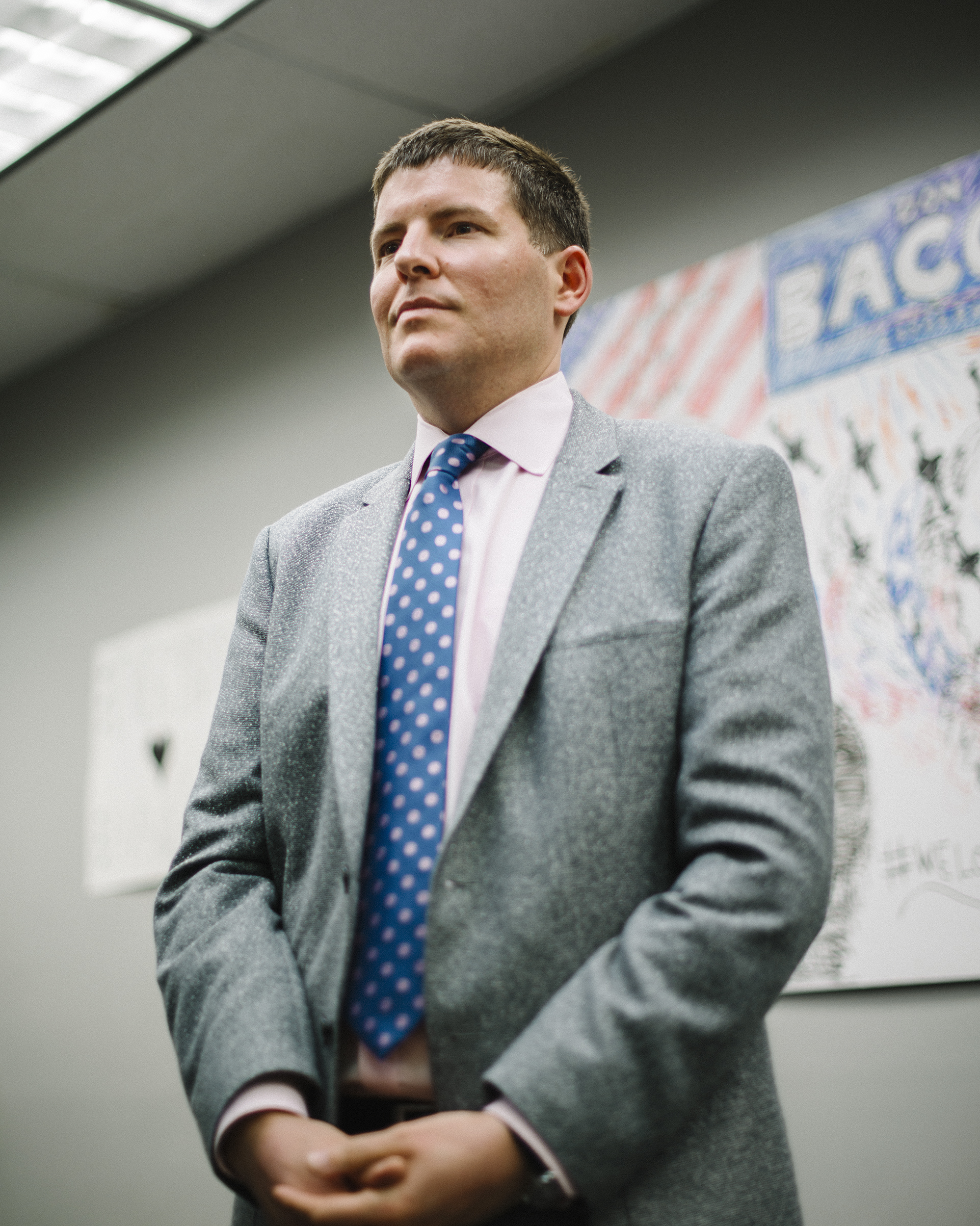
The sun had set on the northwest side of Omaha, and the Christmas lights had come on when a carload of young political canvassers pulled up in front of a brick house in the tony neighborhood known as Champions Run. The activists, some of them still in high school, checked the app that picked their specific political targets and hustled to the front door to make their pitch for GOP Representative Don Bacon. Their talking points focused on Bacon’s service as an Air Force brigadier general and wing commander at nearby Offutt Air Force Base, and his support of the Republicans’ tax-cut package.”Did you vote for him last time?” one of the super PAC’s volunteers cheerfully asked the voter, who greeted the visitors on his front steps. It was 341 days before the 2018 midterm elections.
Welcome to the campaign to keep Congress in Republican hands. The effort to save Bacon’s seat started all the way back in March. While it may seem early for canvassers to be knocking on doors, House Republican leaders believe control of the chamber will come down to the battle to win over a small number of key voters in about 30 districts. And so they have entrusted the $100 million effort to protect the party’s majority to a hard-charging 35-year-old strategist with a brusque manner and a knack for winning tough races. “There are more of us than them,” Corry Bliss explains about Bacon’s district as he rides back from the door-knocking outing to the offices of the Congressional Leadership Fund, the super PAC he runs with the blessing of House Speaker Paul Ryan. “We have to make sure they vote next year.”
History suggests he’s right to worry. Over the past 100 years, first-term Presidents’ parties have lost ground in the House in every midterm election but two, dropping an average of 35 seats in those bad years. Democrats need just 24 seats to retake control and, for now, all the momentum is on the left. The scale of the task is one reason that Bliss’ operation is already active in 21 of the tightest races, from Modesto, Calif., to Key West, Fla. Bliss is betting a targeted early start, combined with out-of-the-box thinking, military discipline and a different political playbook, can keep Republicans in power.
Many in the GOP are banking on Bliss, who has earned a reputation in some GOP circles as the party’s top campaign mind–and perhaps its next Karl Rove. “If anyone could build a breakwall [against a Democratic wave], it’s Corry,” says Mark Isakowitz, a Bliss pal who recruited him to manage Senator Rob Portman’s 2016 campaign. But Bliss’ strategy of going into districts so early with person-to-person persuasion has met more than a few skeptics, including from his own party. “When we announced at the beginning of the year that we were going to do this, the reaction was strong,” Bliss recalls of his plans to start knocking on doors 18 months before voters tuned in: “‘That’s stupid. That’s a waste of money.'” Bliss pauses. “These are also the same people who said Donald Trump wouldn’t be President.” But even he says the odds are against him.

Two weeks before his trip to Omaha, Bliss was perched in his corner office on Pennsylvania Avenue, which has views of the White House complex. As he spoke, he tapped the floor with a baseball bat etched with Wonderboy, a souvenir he picked up at the Baseball Hall of Fame in Cooperstown, N.Y., and a nod to the 1984 film The Natural. “History says we have no chance,” Bliss says of the GOP’s midterm prospects. “It’s our job to defy history.”
Bliss has always been good at calculating his chances. He was born into an upstate–New York horse-racing family–his father is a breeder; his mother and sister are accomplished riders–and he grew up going to the famous track in Saratoga Springs, N.Y. He treats politics like a day at the races: he works the numbers, studies the field and then goes with his gut. “There’s a lot of luck in horse racing [and] a lot of luck in campaigns,” Bliss says. A lot of times, he says, “You’d rather be lucky than good.”
As a political-science major at Boston University, Bliss cared more about the winner’s circle at Suffolk Downs than any campaign. He only caught the politics bug for good as a law student at the City University of New York. “I went to a very liberal law school,” he told a group of young volunteers inside the Congressional Leadership Fund’s Omaha office. “Dealing with a liberal administration drove me nuts, and it made me very conservative.”
Bliss cut his teeth in state legislature fights in Virginia and a governor’s contest in Vermont. Then came Senate races in Connecticut and Georgia. In 2014, Bliss was with his in-laws in Williamsburg, Va., when his phone rang with a request: go to Kansas and take control of the flagging re-election campaign of incumbent Senator Pat Roberts, who was on the outs with voters, in part because of revelations that Roberts no longer lived in the state. No one in Kansas, including the Senator, was impressed when Bliss arrived in a place where he’d never set foot, summoned the Roberts family and shared with them the reality: the third-term Senator was in trouble. “No one likes your father,” Bliss told Roberts’ children, who didn’t take kindly to it. “The good news is even fewer people like [then Senate Democratic leader] Harry Reid.”
Bliss is nothing if not blunt. “Corry has no bedside manner, but you don’t really care if you need CPR,” says a Bliss ally with close ties to Republican leadership. “Corry is the guy we send in when it’s all falling apart.” During a session to prepare Roberts for a debate that first weekend, Bliss asked to see the Senator’s prep book. The strategist took one look, shook his head and tossed it into the garbage. Then Bliss, who had been on the ground less than a day, walked into the office reception area, found a computer that was not password-protected and typed out a one-page cheat sheet: at every opportunity, Roberts should refer to his opponent, a former Democrat who was running as an independent, as either a Reid sycophant, a Barack Obama yes-man or a Democratic Party stooge. Roberts eked out a win by less than 92,000 votes.
This is another page in the Bliss playbook: find a bogeyman and make the race a referendum on that person. Earlier this year, with Democrats on the verge of winning a special election for a House seat in the conservative Atlanta suburbs, Bliss was again dispatched to work his magic. He arrived with $7 million in hand and proceeded to turn the Democratic nominee, a telegenic 30-year-old named Jon Ossoff, into a proxy for Democratic minority leader Nancy Pelosi, who is loathed by many Republicans. “I don’t know what I’d do without her. She’s central to next year,” Bliss says of Pelosi. “You can have Speaker Ryan or you can have Speaker Pelosi. It’s chicken or steak. Fish is not on the menu.”
This approach–and everything Bliss does, really–drives his political opponents bananas. To Democrats, the fact that Republicans had to scramble to save a Georgia seat that had been in Republican hands for almost four decades says more about their own rising fortunes than the GOP’s defensive abilities. “They’re trying to salvage some of these incumbent seats, but the reality is they can’t and they won’t,” says Charlie Kelly, Bliss’ counterpart at the super PAC backed by Pelosi and her lieutenants, House Majority PAC. “They want to talk about Nancy Pelosi, but it won’t be effective because Paul Ryan is the single most unpopular politician in the country.” Consider the Nebraska district where Bliss is working to protect Bacon. A recent survey by Public Policy Polling, a Democratic firm, found Ryan with a 62% disapproval rating among voters there, higher than Trump’s 54% disapproval numbers.
For Bliss, none of this matters so far out from next year’s elections. What counts are the relationships his troops are building at voters’ front doors. Unlike many super-PAC bosses, who often get a cut of the advertising spending, Bliss has little use for pricey media campaigns at this point in the fight. Instead of lining his own pockets by airing commercials, he plans to spend his cash reaching out directly to voters, who are weary of ads. “Super PACs are a legalized Ponzi scheme for consultants to build beach houses,” Bliss says. “We’re going to focus on winning.”
Tapped to run Portman’s 2016 re-election campaign when the Senator was nine points down, Bliss recruited tens of thousands of high schoolers and college students to knock on doors and make phone calls to help Portman–more than a year before voting began. Historically, the Republican National Committee takes charge of that task, albeit much later. But Bliss didn’t have much confidence in the RNC’s will or capacity. So he built his own data, technology and get-out-the-vote machine. He also advised Portman to ignore Trump. “Everyone wanted to talk about the drama and soap opera of the presidential campaign,” says Isakowitz, who has been Portman’s chief of staff since 2014. “We talked about what Rob had done for Lake Erie, for the opioid crisis.” When Trump accepted the party’s nomination in Cleveland, Portman scheduled a counter-convention focused on Ohio voters and veterans. In the end, Portman carried Ohio by 21 points, outperforming Trump by 13.

Not everyone inside the GOP is a fan of Bliss’s methods. When Ryan wanted to tap Bliss to run House Republican leadership’s super PAC and affiliated think tank, he met resistance from high-ranking members of the GOP establishment, including Reince Priebus, the former RNC chairman and Trump’s first White House chief of staff. Ryan, who raises cash for this project, ignored the objections. Since Bliss–and many of his Portman deputies–took over the super PAC, there has been a 100% staff turnover and a new approach that focuses on doors, not ads. “He understands how to win races,” says Representative Mimi Walters of California, a Bliss friend who has helped him raise cash.
Bliss’s take-no-prisoners style can make enemies too. He has little tolerance for Republicans who aren’t team players. When GOP Representative David Young of Iowa wavered on supporting Ryan’s plan to scrap Obamacare earlier this year, Bliss shut down an already-leased office to help Young’s re-election bid, the group’s second in the country. “We will never spend a dollar attacking a Republican. However, there’s a bias in this organization toward friends and family,” Bliss says. “If he didn’t support the Speaker and the President, we couldn’t support him.”
And some question whether his approach can scale to the national level. It’s one thing to burrow into a single race and turn it around. It’s another when the entire country is your map, the goal is to secure 218 Republican seats in the House and you can’t speak directly to the candidates about the nitty-gritty of the campaign because of campaign-finance laws. “You have a super PAC that is trying to talk to voters with high school kids, and is funded by a guy who is incredibly unpopular,” says Dan Sena, who runs House Democrats’ official campaign arm. Already, the Democrats are planning to contest 91 races, putting Bliss on defense.
But so far in this election cycle, Bliss’s approach, with his in-house team of data nerds, researchers and lawyers, has drawn raves in places like Bacon’s Omaha district. “I’ve never seen something as organized as this,” says Jon Tucker, chairman of Nebraska’s Douglas County Republican Party. “All of these contacts are going to show up at the polls and vote for other Republicans.”
At the same time, Bliss isn’t above some of the more traditional approaches to political warfare. His super PAC’s partner, a nonprofit think tank that he also runs, the American Action Network, is providing $30 million in TV ads to push the GOP tax cuts. And Bliss’s super PAC itself will eventually get into the ad game next year. Bliss is already amassing a trove of research about his Democratic opponents for use in those air wars.
The 2017 campaign of Democrat Rob Quist was a vivid illustration of how brutal Bliss can be when he unearths a damaging nugget. Last summer Quist, a folk singer turned upstart political candidate, was mounting a surprisingly strong bid in a special election for Montana’s sole U.S. House seat. Bliss’ research team uncovered Quist’s 1994 testimony in a medical-malpractice lawsuit, which revealed Quist had contracted herpes. Bliss says he leaked the testimony to conservative media outlets, which posted stories that took Quist off the campaign trail at a critical moment. “The point is to win,” Bliss says. “Politics is like sports for adults … I live for the fight.”
Last year, as he was sketching out the groundwork for the GOP’s midterm firewall, Bliss took a rare break. He rented a house in Saratoga Springs and bet on every race for a week. He struck out on the last contest–a costly loss in an otherwise winning week. He shrugged it off, lit a cigar and walked the mile and a half back to his rented home. He still left the track with more money in his pocket than he arrived with. If Bliss can beat the 2018 odds and deliver a similar string of wins next fall, it will have been the young oddsmaker’s talents–and a bit of good luck–that saved Paul Ryan’s grip on the Speaker’s gavel.
More Must-Reads From TIME
- The 100 Most Influential People of 2024
- Coco Gauff Is Playing for Herself Now
- Scenes From Pro-Palestinian Encampments Across U.S. Universities
- 6 Compliments That Land Every Time
- If You're Dating Right Now , You're Brave: Column
- The AI That Could Heal a Divided Internet
- Fallout Is a Brilliant Model for the Future of Video Game Adaptations
- Want Weekly Recs on What to Watch, Read, and More? Sign Up for Worth Your Time
Write to Philip Elliott / Omaha at philip.elliott@time.com